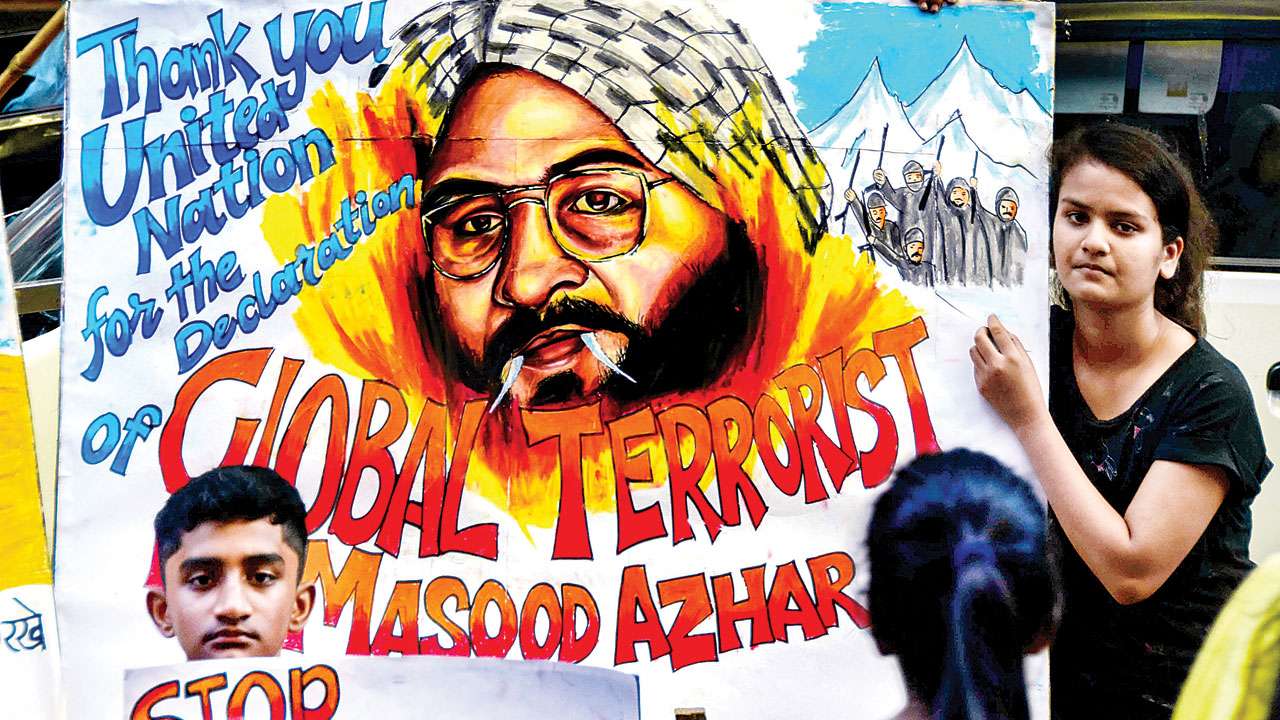
Strangely Jaish-e-Mohammed (JeM) chief Masood Azhar’s long-awaited designation as an international terrorist by the UN Security Council (UNSC) on May 1 evoked celebration on both sides of the border, in India and in Pakistan.
The Indian side had much to celebrate the naming and shaming of Masood Azhar, long a thorn in its side. Azhar founded the JeM in 2000 post his release from an Indian prison in exchange for the passengers held hostage after the much-publicised hijacking of Indian Airlines Flight 814 at the end of December 1999.
Azhar and his JeM are known to have not only perpetrated the dastardly Pulwama car bomb attack on February 14 which killed 40 CRPF personnel but also the attack on the Pathankot Air Force Station in January 2016 and on Indian Parliament in December 2001, among many others. JeM was already designated as a terrorist organisation by various countries including Pakistan itself, UK, US and the UN but attempts in the UNSC to proscribe its leader Masood Azhar failed four times over the last ten years due to the intransigence of China which placed obstacles in the way.
After the Pulwama attack as pressure built up, France and UK joined by the US re-initiated the process on March 13 to label Masood Azhar an international terrorist. However, the process came a cropper in the face of China’s demands to put it on hold pending more information. Under much diplomatic pressure from India and the US, China finally gave its assent which led to the action by the UNSC on May 1. The only slightly awkward thing in it is the absence of any specific mention of the Pulwama carnage and the hand of Azhar behind it. It has given scope to Pakistan to stamp India’s diplomatic victory as a pyrrhic one.
So what is there for Pakistan to celebrate? The sheer idiocy of that nation, its leadership, people and a hugely controlled media became evident when they collectively perceived that the absence of the mention of the Pulwama attack or any specific reference to Azhar’s involvement in Kashmir was a great diplomatic victory for Pakistan.
The spin, for which Pakistan is well known, also attempts to whitewash its entire sponsorship of the proxy war in J&K with perceived certification from the UNSC. The world reads sufficiently between the lines and realises that it was perhaps at China’s insistence that Pulwama and the JeM chief’s personal involvement in Kashmir were omitted from the draft resolution. That is as far as China could be convinced to go even in the light of pressure brought on by trade issues with the US, the spirit of the Wuhan dialogue and the overall emerging strategic environment around South West Asia. Pakistan’s lack of subtlety is reflected by ignorance of the context of the proscription which stares in the face. The world is aware that the process of the UNSC commenced this time, with Pulwama and the final proscription was a progression of events commencing with the February 2019 condemnation by the UNSC. UN Secretary General Antonio Guterres had then reiterated his strong condemnation of the Pulwama attack. It will only be with wishful thinking that Pakistan will not perceive the effect of this proscription on the Financial Action Task Force (FATF) proceedings, which could certify insufficiency of efforts by Pakistan to curb terror activities from its soil.
Even with cause for celebration in India, most people appeared to overestimate and misread the effect of the UNSC action. I had queries inquiring how soon this would affect JeM’s capability in Kashmir, especially in light of recent achievements of the Army against JeM cadres. What we need to understand is that Azhar’s proscription is not the last act to marginalise him and the JeM; it’s just about the beginning. Lashkar e Taiyaba (LeT) leader Hafiz Sayeed’s similar proscription and placement of a $10 million bounty on his head had little effect on LeT capability and intent on the ground.
The foreign terrorist (FT) group structures are today much reliant on the separatist networks due to extensive army control over infiltration. The army and police must work towards prevention of the creation of alternative leadership and induction of fresh local cadres, to keep the initiative.
Virtually in anticipation of the UNSC decision, Pakistan ISPR chief Maj Gen Asif Ghafoor conducted a long presser two days prior. He went hammer and tongs after the Pashtoon Tahafuz Movement (PTM) to balance the effect of the UNSC proceedings, accusing PTM of sponsorship from India and Afghanistan. He then warned India that Pakistan was not the same country which succumbed in 1971 and continued to deny the impact of Balakot attack.
This is a new normal with Pakistan’s deep state which must be read in conjunction with its celebration of the proscription of Masood Azhar by the UNSC. It strongly believes that with each climb of a rung on the military escalatory ladder India only proves that in the threshold below conventional war Pakistan can match it action for action; even in the conventional fold, it has enough in its nuclear arsenal to deter or dissuade Indian adventurism. Given this belief and the idea that Azhar’s proscription is not linked to Kashmir, the Pakistani deep state could feel encouraged to continue with acts of proxy war.
Should India, therefore, brace itself for more terror against itself? What the next government will need to do is to continue playing aggressively in the diplomatic field. Pakistan is financially on the back foot. The pressure at the FATF, with the big powers and engagement with China in the Wuhan spirit, may discourage Pakistan’s deep state from attempting to do something spectacular early in the tenure of the next government.
The author commanded the 15 Corps in J&K